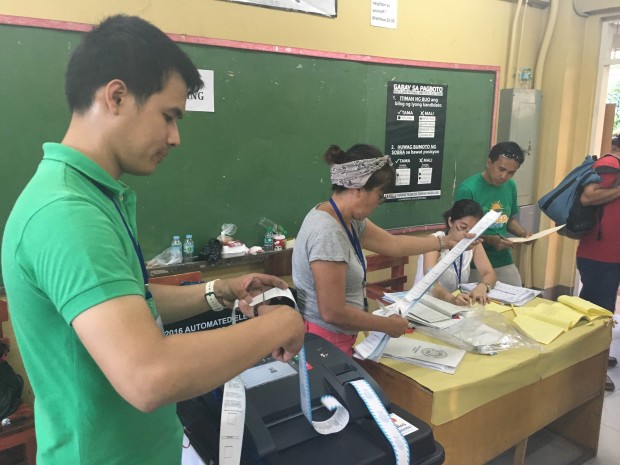
Board of election inspectors process the transmission of election results at a precinct in Manuel Roxas High School in Paco, Manila. ANTHONY Q. ESGUERRA/INQUIRER.net
Monday’s general elections set records for size as the largest electronic vote count in history and for the speed of the tally, with 80-percent vote transmission rate just four hours after the polls closed, the election technology provider said on Wednesday.
In a press statement, the London-based Smartmatic said results were registered, counted and published online in real time. The first votes were transmitted from 13 regions just one minute after the polls closed. Within two hours, 66 percent of the vote counting machines (VCM) had transmitted results, compared with only 17 percent in the 2010 presidential elections.
“Leveraging technology and the committed effort of the society as a whole, we conducted a record-breaking election which delivered accurate, transparent and legitimate results and contributed to a historic turnout of 81.7 percent,” the Smartmatic statement quoted Andres Bautista, chair of the Commission on Elections (Comelec).
Antonio Mugica, the chief executive officer of Smartmatic, said the global election solutions company was proud to be part of the largest electronic vote counting project in history.
“In only six years, the Philippines has become a world reference point for automation and well-run elections. This has also been a landmark with the largest ever manufacture and deployment of vote counting machines, making this a truly historic moment,” Mugica said.
But not everyone was happy.
The election group Automated Election System (AES) Watch said all was not well with the 2016 elections, saying it was marred by anomalies, including glitches in the vote counting machines, disenfranchisement, hacking, mismatched results and non-compliance with the automated election law.
“It was even worse than the 2010 and 2013 automated elections,’’ said AES Watch, a perennial critic of Smartmatic and the Comelec.
It called for a congressional investigation into the “‘ill preparedness of the Comelec in complying with the minimum system requirements of the automated election law.’’


